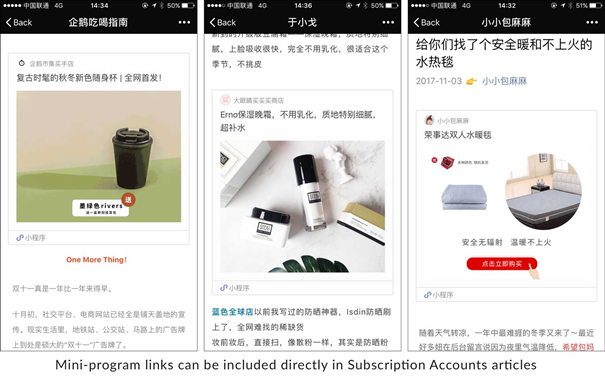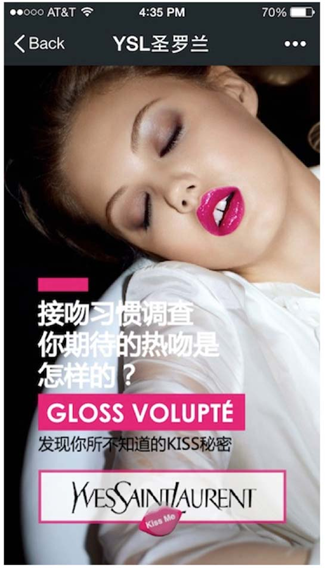WeChat’s new functions in 2019: Mini Programs become sales channels
08/08/19
4'
WeChat’s so-called Mini Programs are applications that customers can access without leaving the platform. This means that users are no longer forced to install new apps separately on their smartphones since they might already be in WeChat.
These integrated mini-applications cover all types of services: online trading, food delivery, government services, etc. Users can also receive tailored suggestions for new Mini Programs based on their current location.
Traditional retail apps become superfluous
Users are able to place orders directly on e-commerce applications, using the WeChat’s integrated payment function WeChat Pay. This renders the retailer’s official app useless since WeChat combines both order and payment. Mini Programs integrated in WeChat are therefore important competitors of the traditional app stores.
Mini Programs already boast almost 170 million daily active users (DAUs) in WeChat. Since 94% of the Chinese population use WeChat daily, there is no better app to make your brand visible. In addition to an official WeChat account, you can now create your Mini Program for WeChat. This has several advantages.
WeChat’s all-in-one solution allows Chinese consumers to share these Mini Programs, promotions or items of interest with friends and family. Discount promotions and products are more appealing when shared as part of a Mini Program rather than as a simple, loose link.

35% users learn about new Mini Programs because they have been shared by friends or acquaintances. Direct exchange between users reduces the cost of attracting new customers, as brands require less budget for advertising.
Why should retailers and brands should take a closer look at Mini Programs?
IMore and more international brands are launching their e-commerce platforms with mini-programs for the Chinese market. Leading brands such as YSL Beauty, L’Oréal Paris, Dior and Sephora use WeChat Mini Programs to sell directly to Chinese consumers. The following are examples of campaigns for Mini Programs from major brands.

YSL Beauty: For the occasion of Valentine’s Day in 2018 (7th August in China), YSL Beauty launched a Mini Program to purchase and send gifts with personalised gift packaging. To promote the program, the company used WeChat Moments Ads (similar to the Facebook News Feed). The click-through rate was 280% above the industry average and, according to Tencent, YSL Beauty sold its two most expensive gift packages in half a day.

Feelunique: British cosmetics brand Feelunique launched a 6 day group buying campaign within its WeChat Mini Program. Customers could benefit from a 37% discount if they persuaded a friend to buy the same product at the same price. After confirming their order, customers were required to provide their friend with a promotional photo so they could scan a QR code to benefit from the discount. 90% of participants were new customers. Therefore this group buying campaign enabled Feelunique to reduce customer acquisition costs, and avoid spending money on advertising.
Mini Programs benefit from the WeChat user base. On the one hand, online shopping with mini programs can increase the use of Wechat Pay and Wechat Moments ads. On the other hand, it could harm Alibaba and its e-commerce platforms in the long run.
Live streaming via Mini Programs
In June 2019, a live streaming function was added to Mini Programs.
The Chinese live streaming industry has grown exponentially in recent years. Live streaming has become an important means of consumption and was quickly accepted as a means to promote products or services online. Currently, major social and e-commerce networks such as Taobao, JD.com and Weibo are at the forefront of the trend
In this specific case, WeChat initiates live streaming shopping via Mini Programs.
Luxury brands and live streaming
This year, L’Oréal Paris transformed the Cannes Film Festival into a shopping destination for Chinese consumers: the festival’s WeChat Mini Program enabled purchases to be made live from the event under the caption “See now, buy now”.
To attract consumers, L’Oréal worked with several Chinese celebrities and influencers who broadcasted the fashion and makeup “moments” live from the Cannes red carpet, enabling fans to comment directly when watching the videos.
Sources: jingdaily.com, marketing-chine.com
Your e-commerce library
E-commerce for Retailers
Learn moreE-commerce for Brands
Learn moreL'Oréal Luxe Success Story
Learn moreSign up for our newsletter
By submitting this form you authorize Lengow to process your data for the purpose of sending you Lengow newsletters . You have the right to access, rectify and delete this data, to oppose its processing, to limit its use, to render it portable and to define the guidelines relating to its fate in the event of death. You can exercise these rights at any time by writing to dpo@lengow.com

Trending Posts
Marketing channels
Where does Gen Z shop online?
Gen Z online shopping is transforming the digital marketplace, setting trends that redefine what it means to engage with brands…
16/04/24
9'
Marketplaces
The Top 10 Marketplaces in Europe
The e-commerce scene is a vibrant mix of marketplaces in Europe. These aren't just websites; they're bustling hubs where millions…
08/12/23
7'
Marketplaces
Lengow Now Fully Supports Zalando Logistics Solutions ZSS and ZRS
Zalando, one of Europe’s leading fashion marketplaces, continues to raise the bar with its advanced logistics and fulfillment programs. After…
12/12/24
4'
Marketplaces
How to win the Buy Box on Marketplaces (Amazon, Zalando, etc.)
What is the most important thing for marketplace sellers? Exactly, the Buy Box! If you don't have the Buy Box…
02/04/24
10'
Marketplaces
How to Sell on Temu? Best Tips
Emerging under the vast umbrella of PDD Holdings Inc., Temu has skyrocketed in popularity as a shopping sensation from China…
17/08/23
5'




